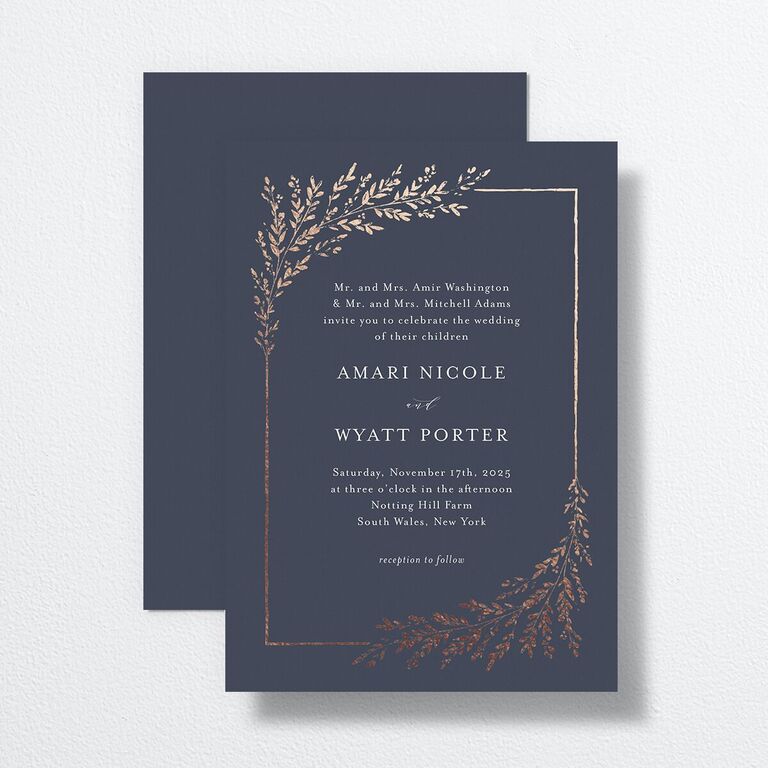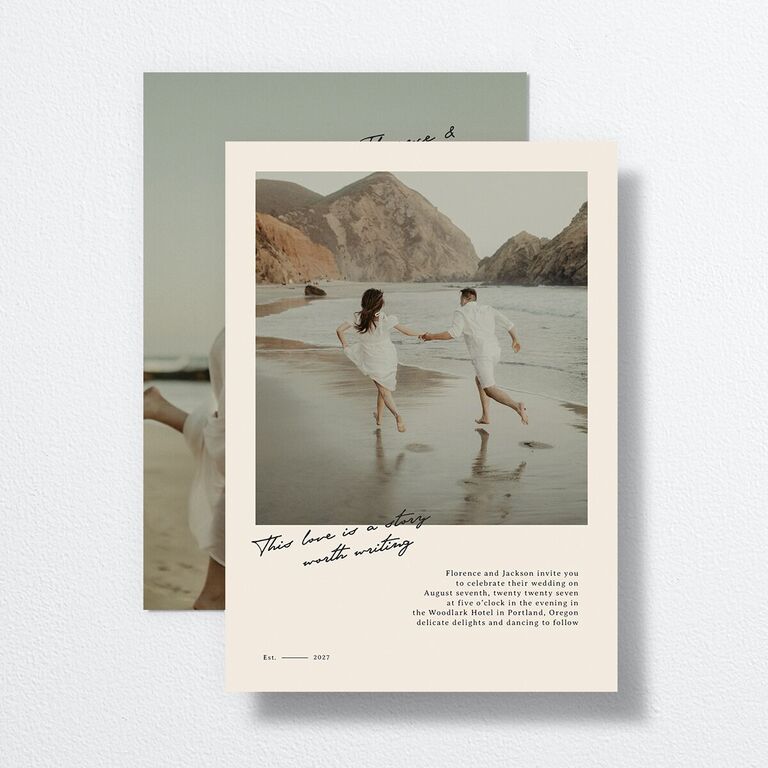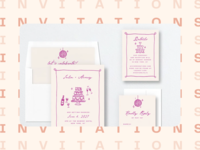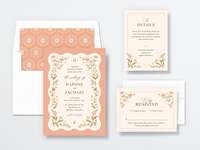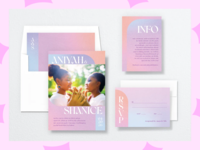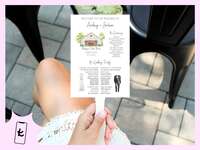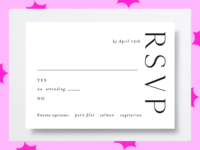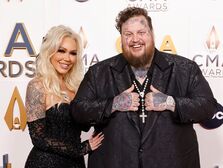Wedding Invitations: How to Address Someone Who Graduated Law School
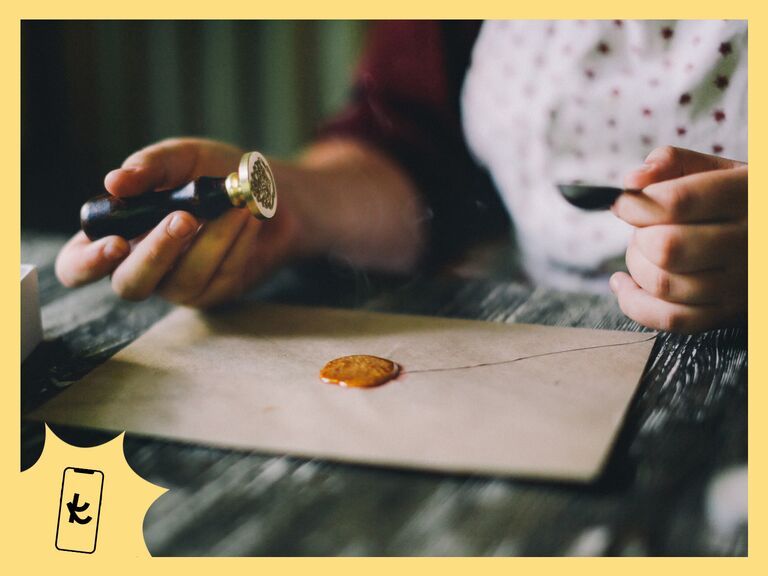
Your envelopes, stamps, pen and pretty stationery are at the ready—you've finally found time to address your wedding invitations. But the etiquette for a few names might stop you in your tracks. After all, when it comes to wedding invitations, how do you address someone who graduated law school? Lawyer titles run the gamut, and you want to make sure you're properly addressing wedding invitations to them. So, we talked to a couple of lawyers themselves and a stationery designer on best practices. Once you've collected all your guest addresses in our Guest List tool and filtered through the design, style and color options to find your dream invitation suite using The Knot Invitations (which offers both recipient and return addressing for free!), you'll know exactly how to address an attorney on your wedding invitation.
In this article:
- How to Address a Lawyer on a Wedding Invitation
- Addressing Lawyers on an Envelope: Frequently Asked Questions
How to Address a Lawyer on a Wedding Invitation
Just how do you address a lawyer on your wedding invitation so you can avoid making any wedding invitation mistakes? Turns out, the etiquette isn't quite as complicated as you may think (most wedding invitation etiquette isn't either!).
"The terms Esquire, Attorney at Law and JD are professional designations and not social titles, so whether the guest is a practicing lawyer or a graduate of law school, their social titles—Mr./Mrs./Ms.—would be used," explains Jenny Sanders of Arden Paper. "It's similar to someone who is a CPA; their invitations would not include this designation."
"I would address them as you would anyone else," seconds Golnoush Goharzad, founder of Goharzad Law. "And if you have a long-term personal relationship with him, their status as a lawyer is even less relevant, and you can address them as you would any friend."
That said, the traditional and most respectful way to address a lawyer on an envelope for a wedding invitation is to use their full name followed by Esquire, says Seann Malloy, founder and managing partner at Malloy Law Offices. If you want to include this designation, you would skip the courtesy title (Mr. or Ms.), as it's usually one or the other, not both.
Example:
On the outer envelope:
Joe Smith, Esquire
On the inner envelope:
Mr. Joe Smith, Mr. Smith or Joe
Example with a plus one:
On the outer envelope:
Joe Smith, Esquire and Ms. Anna Grant
On the inner envelope:
Mr. Smith and Ms. Grant or Joe and Anna
Now, if the lawyer in question is a judge or has another significant legal designation, Malloy says that designation takes precedence. Judges should be referred to by their judicial title and not as Esquire. Sanders adds that "The Honorable" would be the most formal, with Judge being slightly less so.
Example:
On the outer envelope:
The Honorable David Ross
On the inner envelope:
Mr. David Ross, Mr. Ross or David
On the outer envelope:
Judge David Ross
On the inner envelope:
Mr. David Ross, Mr. Ross or David
For the invite itself, we suggest adding a QR code on the wedding invitation. They level up your stationery and make it very easy for busy guests like lawyers to RSVP.



Addressing Lawyers on an Envelope: Frequently Asked Questions
So you've figured out what to include in a wedding invitation suite, but still have questions about addressing lawyers. Below, we've laid out a few more specifics to address those beautiful wedding invitations.
Do You Abbreviate Esquire on Envelopes?
Esquire should be spelled out completely on formal invitations, says Malloy, who explains that the abbreviation Esq. is most often found in business letters and email signatures, not social occasions. If you're wondering how to address an attorney in a letter or how to address a lawyer in a letter, stick with the abbreviation.
"For wedding envelopes, always write 'Esquire,'" Malloy says. "It's also crucial to remember that the word comes after the full name, not before, and is never used with just the first name."
Does It Vary Based on the Type of Lawyer?
Unless you are inviting a judge or attorney with another significant legal destination, Esquire is the catchall term for lawyers. Skip the lawyer initials of JD. "Esquire is a formal way of addressing lawyers in the US without having to mention degrees like JD or titles such as Attorney at Law," Malloy says.
How Do You Address Couples Who Are Both Lawyers?
"Since Esquire/Attorney at Law/JD isn't typically used, you would use the same guidance as any couple, married or unmarried," Sanders says. But if one of the guests is a judge, she advises addressing the envelopes as follows:
Example for a married couple where one is a judge (the person with the higher title will be listed first, regardless of gender)
On the outer envelope:
The Honorable Lily Ross and Mr. David Ross or Judge Lily Ross and Mr. David Ross
On the inner envelope:
Mr. and Mrs. David Ross, Mr. and Mrs. Ross, or David and Lily
Example for unmarried couple where one is a judge:
On the outer envelope:
The Honorable David Ross and Ms. Lily Parker or Judge David Ross and Ms. Lily Parker
On the inner envelope:
Mr. David Ross and Ms. Lily Parker or David and Lily
Example for couple where both are judges
On the outer envelope:
The Honorable David Ross and The Honorable Lily Ross
On the inner envelope:
Mr. and Mrs. David Ross, Mr. and Mrs. Ross, or David and Lily
Now that you've got all the logistics surrounding lawyer invitations down, you just need to know when to send wedding invitations and tips for mailing wedding invitations. And keep in mind that lawyer wedding invitations aren't the only ones you may need to give thought to—consider our guide to addressing military wedding invitations, for example.
But, at the end of the day, don't sweat the etiquette. As Sanders points out, you can find slightly different answers to almost any etiquette question. "We do live in a slightly more informal time, so if you have heard something differently, go with what you think is best and you will be fine," she says. "There is no actual etiquette police, after all."

